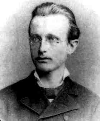Max Planck

Max Karl Ernst Ludwig Planck was born on 23 April in Kiel Germany. He was the sixth child in a family devoted to the church and state. His father was a prominent jurist and professor of law at the University of Kiel. At the age of 9, his father received a post at the University of Munich, and Planck attended the Maximilian Gymnasium. While there Planck succeeded very well in all subjects and he gained an interest in physics and mathematics finally graduating at the age of 17.
He found it difficult to make a decision on what career he was going to aim for, finally settling for physics rather than music or classical philogy, since he believed he had his greatest originality within that physics. He was an excellent pianist and found great pleasure in playing, having the gift of absolute pitch. Another passion of his was hiking, mountain climbing and taking long walks as regularly as possible.
In 1874 Planck entered the University of Munich, and was unimpressed with his physics professor there, Professor Phillip von Jolly. He did, however, find intellectual stimulation through self study. Planck was deeply impressed by the law of conservation of energy and he became convinced that the second law of termodynamics was an absolute law of nature.
Planck based his doctoral dissertation on the second law of thermodynamics and in July 1879, at the young age of 21 he received his doctoral degree. Following this he completed his qualifying dissertation at Munich and he employed as a lecturer (Privatdozent). With the help of his father in 1885 he took up the position of associate professor at the University of Kiel becoming a full professor in 1892 at the University of Berlin when Kirchoff died. Planck lectured on all branches of theoretical physics and had nine doctoral students study under him.
Planck was intrigued by the law discovered by his colleague Wilhelm Wien in 1896. He made several attempts at deriving this law, starting from the second law of thermodynamics as a base Experimental evidence was coming to light which showed that Wiens law broke down completely at low frequencies but was perfectly viable at high frequencies.
Plank guessed that, since the entropy of radiation depended mathematically on it's energy in the high frequency range due to Wiens law, and that because he knew what the dependance was in the low frequency region, he should somehow combine these two properties in some simple manner resulting in a formula relating frequency, to the energy of radiation. The formula was hailed a great success, but Planck noted that it was just a formula; a lucky guess which still had to be derived from first principles inorder to give it a proper scientific standing.
In 1900, at the age of 42, Planck achieved this, but in the process he had to abandon one of his greatest beliefs - that the second law of thermodynamics was an absolute law of nature. He was forced to accept Ludwig Boltzmann's statistical explanation for the second law. Planck also had to assume that the black body oscillators could only absorb and emit energy in discrete amounts of energy - packets of energy which he called quanta. Only by carrying out a statistical analysis of these quanta of energy could Planck derive his formula.
Each quanta contained an energy directly proportional to a constant, h, multiplied by the frequency of oscillation of the particular blackbody oscillator associated with that quanta. Using his formula he calculated a value for Boltzmanns constant, Avogadros numer, the charge of the electron as well as the constant h. As time passed others came to realise that because of the finite, non-zero value of h, the world at atomic dimensions could not be explained with classical mechanics. The quantum age had truly begun!
Planck was very reluctant to introduce his revolutionary idea on the quantisation of energy, and only by being forced by pure logic did he do so. It took a number of years before Planck's ideas were generally recognised and it was the likes of Einstein, Bohr and Poincare who developed the quantum idea further in the early half of the century.
In 1912 Planck became the permanent scretary of the mathematics and physics sections of the Prussian Academy of Sciences and continued to hold the post until 1938.
In 1918 he received the Nobel Prize for Physics for his work on introducing the quantum. Along side Einstein and Schrodinger, he sternly opposed the statistical view held by Bohr, Born, Heisenberg and many others which was introduced to quantum mechanics in 1925-26. Planck retired in 1928, with Erwin Shrodinger taking his place until the Nazis took power in 1933.
In 1930 Planck became the president of the Kaiser Wilhelm society (now known as the Max Planck Society) until 1937.
Planck suffered many personal tragedies, including losing two sons and daughters at an early age. One of his sons, Erwin, was killed by the Gestapo due to a failed bombing of Hitler in 1944. This incident left Planck without the will to live. He died on the 4th October, 1947 aged 89.